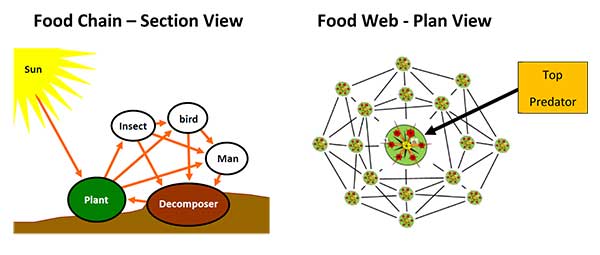 P.O. Box 941120 , Maitland , FL 32794-1120
P.O. Box 941120 , Maitland , FL 32794-1120 dmarks@cfl.rr.com
dmarks@cfl.rr.com  407.694.7040
407.694.7040
A food chain is the feeding relationship between organisms in a community, where energy is transferred from one organism to another. An ecosystem contains many food chains; these feeding relationships are called a food web. The energy from the sun, along with inorganic resources, are converted to energy in plants through the process of photosynthesis. This energy is then captured by animals as they eat the plants, and then by other animals, as they are in turn eaten. When these organisms die, decomposers break them down back into inorganic resources that are then reused by plants to continue the food chain.
Each organism in a food chain has its niche, over time these relationships create a stable environment in the ecosystem. An organism can be replaced in its niche in two ways; through competition with other organisms, and from its own offspring. This stability in the ecosystem is like the stability that is created in an organism, called homeostasis. Through a food web, there is no single organizing brain, but many self-interested organisms preforming their various tasks.

Living systems reflect their niche (job) in their food chain; their environment shapes the life form. Our DNA is just programming code to start the process of life. It takes being placed in an environment for the organic program to grow and develop. Evolution is the process of living systems changing and fitting better into their environment over time. The environment creates the opportunity or niche; the niche drives the required activity (function), which drives the form of the organism through evolution. We become part of the environment’s food web.
Living systems consume their environment; they consume food from their environment, and they also consume experiences from their environment. Life reflects its environment. Think of the difference between a cat or dog that has been domesticated, verses a feral version. It is the same DNA, but they have two very different world views and outcomes. The same can be said for people, we can tell a lot about a person from where they come from? Do they come from the big city or a small town? This impacts their life experiences and how they interact with the world. In a small town, most daily interactions can be with the same group of people, throughout a person’s life, like a big family. In a large city, many or most of a person’s daily interactions can be with strangers, just impersonal interactions, with little social value.